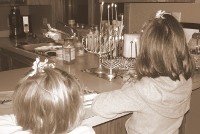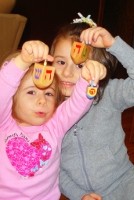
You know when you walk into a store, a movie theater, a restaurant, a bus, really ANYWHERE anytime after Thanksgiving, and you buy your gift, movie ticket, meal, bus ticket and so on, you inevitably get wished a “Merry Christmas?” How do you feel about that? Warm and fuzzy or … not so much?
Don’t judge me here, but in my college days (and to tell you the truth, probably longer), I was one of those we-must-educate-EVERYONE kind of gals. And I would get kind of miffed when wished an occasional “Merry Christmas” here and there. “Don’t they KNOW that not everyone celebrates Christmas? Don’t they CARE?” Well, to be perfectly honest, no “they” don’t. And at the risk of being TOO honest here, I just don’t think that’s something to get into a tussle about.
After years of nursing a certain amount of December angst about this topic, I  was chatting it up with one of my favorite rabbis and he posed this question, “As someone who doesn’t celebrate the holiday, how do you react when told “Merry Christmas?” I was well prepared with an indignant response and a heated conversation (remember, I’d had YEARS of practice) when my favorite rabbi blew me away with, “The good news is, they’re wishing you well. Holiday wishes come from the right place. Make sure you wish them well, too.”
was chatting it up with one of my favorite rabbis and he posed this question, “As someone who doesn’t celebrate the holiday, how do you react when told “Merry Christmas?” I was well prepared with an indignant response and a heated conversation (remember, I’d had YEARS of practice) when my favorite rabbi blew me away with, “The good news is, they’re wishing you well. Holiday wishes come from the right place. Make sure you wish them well, too.”
Not what you expected, right? Me, neither! But I have never forgotten those words and I keep them close to my heart every time anyone makes an assumption about my or my children’s backgrounds. Those are them up there. Verbatim. You can use them, too, if you’d like. Because of course that’s EXACTLY the kind of grace that I’d like to teach my kids. During the December holiday season when let’s just face it, people are not at their best: stressed, tired and sometimes rude; grace is the way to go. As is the high road. And as is assuming people are coming from a good place with good intentions.
Our kids need good language to use during the holiday season. Every single day they can expect to be asked, “Are you coming to see Santa today? What’s on your Christmas list? Did you already decorate your tree?” And they need to practice how to comfortably respond. We could educate these well-meaning people (and often just little old ladies at the grocery store) about diversity, and what happens when we assume, and our town’s population religious statistics. But what would our kids learn about the world and their place in it from this kind of reaction? How would they feel? Warm and fuzzy or…not so much?
 There are very few things that I know for sure. But here’s a few that I’m positive about. I live in a place where most people celebrate Christmas, love it and assume that I do, too. Most people are good and kind and are truly wishing you well. Wish them well back. Be graceful, kind and approach everyone assuming that they are graceful and kind, too. Santa might not really be watching, but your kids sure are.
There are very few things that I know for sure. But here’s a few that I’m positive about. I live in a place where most people celebrate Christmas, love it and assume that I do, too. Most people are good and kind and are truly wishing you well. Wish them well back. Be graceful, kind and approach everyone assuming that they are graceful and kind, too. Santa might not really be watching, but your kids sure are.




Galit,
What DO you have your kids say back? Not having kids myself, I forget that (of course) they get asked things like “Are you going to see Santa?” and not just told “Merry Christmas.” What does grace from a 6 year old sound like? Any particularly well-worded responses you can share?
Love the sentiment, and another great post! 🙂
-Sara
I must admit I do get frustrated when people wish me a Merry Christmas. It’s even more frustrating here as I have lived in New York, New Jersey and Chicago where there are considerably more Jews than here in the Twin Cities and Minnesota. However, I must agree a tad with the Rabbi you referr to as people are wishing you something from their heart. Yes I would agree be polite. But I also have to agree that people, especially here in the midwest, need to be politely educated that not all people celebrate Christmas. Certainly a dilema!
Hi Ladies! Thanks for the notes; they’re both much appreciated.
Gwyn, I hear you completely, I too have lived in more Jewish places like NJ and CA and it did take some getting used to here! I remember tearing up my first Hanukah in MN because I didn’t know where to find candles. We’ve come a long way since then; why thank you Target end caps! 🙂
& Sara, I’ll be honest with you, it’s a work in progress at our house simply because there’s so many variations of who might ask our kids what. There has been an occasional painful moment when my girls stare blankly at someone. I can almost hear their little wheels turning trying to pinpoint what to say. Practice, practice.
What we’ve explained and hopefully modeled is if it’s someone that we know, like a friend or our hairdresser for example, whom they see often and will continue to see years to come to just simply tell them we celebrate Hanukah, what we like about it and to ask back, “You know what? I celebrate Hanukah. I love the latkes and the presents. Have you decorated your tree yet?” Or whatever it was they were asked. Thus far, this has ended up to be a nice learning moment. I’m always amazed at how many questions people have about Hanukah that they’ve been waiting for the opportunity to ask. It also gives my kids a chance to ask their burning questions, like how many lights do you have?! 🙂
On the the flip-side, if it is just someone at a grocery store that we don’t know and are not likely to come across again, we aim for simple: Tree:”No, have you?” Santa: “Not today, how about you?” Excited: “I love holidays!” Or any variation of shared fun sentiment, always with a smile and an attempt to ask back. 🙂
How’s that for a LOT of info?! 🙂
Honestly, if you are offended by “Merry Christmas” or “Happy Holidays” or “Happy Solstice” or anything else, you’re a jerk. If someone is nice to you, be kind back. That is how civilization maintains harmony. If YOU don’t make an issue out of it, neither will Bill O’Reilly and the other morons that think there’s a “war” on Christmas.
Hi Allan! Good to hear from you. Agreed– people are kind, not jerks! 🙂 Happy Holidays to you!
Galit!!! Love you post (obviously, since my topic is basically the same on TCJewfolk today.) Of course your tone is lovely and kind and mine is, well . . . take a look! 😉